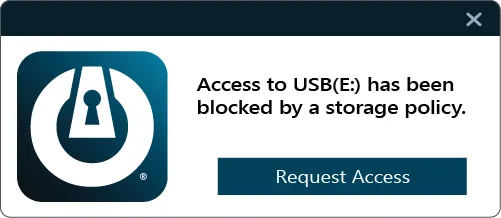Storage Control allows you to protect your data from unauthorized access or theft by setting granular policies over your storage devices.


Storage Control provides policy-driven control over storage devices, whether the storage device is a local folder, a network share, or external storage such as a USB drive. ThreatLocker® Storage Control allows granular policies to be set, which could be as simple as blocking USB drives, or as detailed as blocking access to your backup share, except when accessed by your backup application.
The Unified Audit provides a central log of all storage access by users on the network and those working remotely, down to the exact files that were copied and the device's serial number.
When Storage Control blocks a storage device, the user is presented with a pop-up where they can request access to the storage device. The administrator can then choose to permit the storage device in as little as 60 seconds.


A full detailed audit of all file access on USB, network, and local hard drives is centrally accessible within minutes of a file being opened.

These policies allow or deny access to storage based on user, time, applications, and more.

A pop-up with the option to request access to the storage device.

USB policies allow access based on device serial number, vendor, and/ or file type.


Try ThreatLocker free for 30 days and experience full Zero Trust protection in your own environment.
Schedule a customized demo and explore how ThreatLocker aligns with your security goals.
Just starting to explore our platform? Find out what ThreatLocker is, how it works, and how it’s different.